Products
Product Resources
FT-IR microscope
The Lumos stand-alone FT-IR microscope from Bruker Optics is designed for visible inspection and infrared spectral analysis. According to the company, all internal moveable components are motorized and the instrument's software guides operate stepwise through the process of data acquisition. Bruker Optics, Billerica, MA;
www.brukeroptics.com/lumos.html
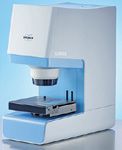
ICP valve system
Glass Expansion's Assist automation accessory reportedly combines a dual syringe module with a multiport valve module to automate sample and internal standard (or diluent) introduction to an ICP-OES or MS system. According to the company, when used with the instrument's standard autosampler, the accessory speeds the cycle time by a factor of two or more. Glass Expansion Inc., Pocasset, MA;
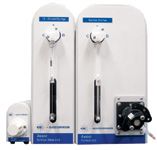
Raman microscopy reaction chamber
Harrick's Flat-Top high-temperature reaction chamber for Raman microspectroscopy is designed with a single horizontal window and a low profile for compatibility with Raman instrumentation. According to the company, the chamber allows environments with temperatures up to 910 °C, with pressures ranging from 10-6 to 2200 Torr. Harrick Scientific Products, Pleasantville, NY;

Low-light camera
Andor's Zyla sCMOS camera is designed to provide high speed, high sensitivity imaging. According to the company, the TE-cooled instrument has sustained frame rate performance of up to 100 fps. A 30-fps version, which reportedly has 1.3 e- rms read noise, also is available. Andor Technology, South Windsor, CT;

Raman spectral searching software
The KnowItAll Informatics System software package from Bio-Rad Laboratories will be offered for use with the Horiba Scientific Raman spectrometers, via Horiba's LabSpec data acquisition processing software. According to the company, the software's functionality includes spectral searching, mixture analysis, database creation, and the AnalyzeIt spectrum/structure correlation feature. Horiba Scientific,Edison, NJ;
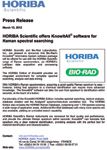
LEDs for spectroscopy
Full spectrum light-emitting diodes for spectroscopy from Mightex reportedly have a lifetime of >25,000 h, a tailorable output spectrum, and an interchangeable fiber. According to the company, the output spectrum does not change with intensity adjustment. Mightex Systems, Pleasanton, CA;
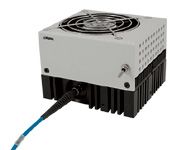
X-ray windows
DuraBeryllium X-ray windows from Moxtek are designed to be resistant to many solvents, acids, and bases. The company's DuraBeryllium Plus film reportedly provides maximum corrosion resistance. According to the company, the product is a low-Z material that when applied to beryllium creates a hermetic, corrosion-resistant window that is used for ultrahigh-vacuum applications. Moxtek, Orem, UT;
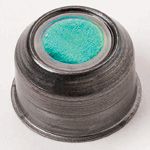
Hyperspectral imager
Bodkin Design & Engineering's VNIR-90 hyperspectral imager is designed with an optical processor and can be mounted on a moving platform, handheld, or used to capture transient events or moving objects. According to the company, the imager covers the spectral range of 500–910 nm and produces a data cube of 55 x 44 spatial pixels x 90 spectral bins.Bodkin Design & Engineering, LLC, Newton, MA;
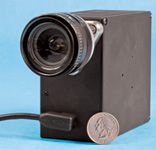
Raman microscope
Renishaw's inVia Raman microscope is designed with a 3D imaging capability that allows users to collect and display Raman data from within transparent materials. According to the company, the instrument's StreamLineHR feature collects data from a series of planes within materials, processes it, and displays it as 3D volume images representing quantities such as band intensity. Renishaw, Hoffman Estates, IL;
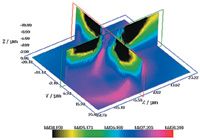
EDXRF spectrometer
The benchtop NEX QC VS energy dispersive X-ray fluorescence spectrometer from Rigaku is designed to provide a variable analysis spot size. According to the company, the analyzer features a single-position sample stage with three analysis spot size options: 3, 8, and 14 mm. The analyzer reportedly can be used for quantitative analysis of elements ranging from sodium to uranium in solids, liquids, and powders. Rigaku Corporation, The Woodlands, TX;
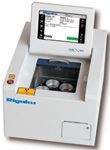
Raman spectroscopy systems
Thermo Scientific's Crimefighter packages are equipped with the company's DXR Raman microscope or DXR SmartRaman spectrometer and are designed to facilitate positive identification of trace compounds, illicit drugs, chemical intermediates, and other highly sensitive evidence. According to the company, the packages include a comprehensive library of compounds encountered in law enforcement available for laboratory Raman systems. Thermo Fisher Scientific, Madison, WI;
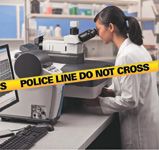
Chemical reaction monitor
The MB-Rx in-situ chemical reaction monitor from ABB Analytical Measurements is designed for use in laboratories and pilot plants. According to the company, the monitor is a plug-and-play system that provides real-time information about chemical or biochemical reaction kinetics and parameters. Data reportedly are collected with an insertion probe and can be analyzed via a software interface. ABB Analytical Measurements, Quebec, Canada;
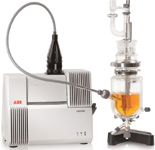
Microspectrometer
The Avabench-RS miniature spectometer from Avantes is designed for flexibility and configurability. The spectrometer's slit and connector reportedly can be changed using a screwdriver. According to the company, the instrument's optical bench is available in all UV–vis–NIR AvaSpec spectrometers. Avantes, Broomfield, CO;

XRF kit
Amptek's XRF Kit is designed to help users begin performing elemental analysis via X-ray fluorescence. According to the company, the kit includes the company's X-123 complete spectrometer with an SDD or Si-PIN detector; a mini-X USB controlled X-ray tube; XRF-FP QA software; a mounting plate; and a test sample. Amptek Inc., Bedford, MA;
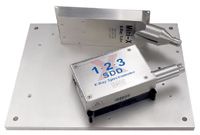
Hyperspectral imaging system
The HI 90 hyperspectral imaging system from Bruker Optics is designed as a remote chemical sensing system that permits detection, identification, and quantification of hazardous gas clouds. According to the company, the system allows remote operation several kilometers from the area of interest. Bruker Optics, Billerica, MA;
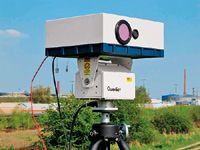
Calibration standards
HellmaUSA, a calibration laboratory that produces and certifies liquid and gas calibration filters for testing spectrophotometers, was accredited according to DIN EN ISO 17025. According to the company, the DIN EN ISO 17025 ensures the traceability of calibrations to references of the National Institute of Standards and Technology, which gives laboratories greater transparency and improved protection over measurement results. HellmaUSA, Plainview, NY;
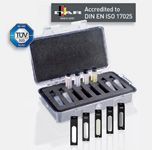
Raman software
LabSpec 6 Raman software from Horiba Scientific is designed to guide researchers through system setup, Raman spectrum data and map acquisition, measurement and data processing, and report generation. The software reportedly offers comprehensive data acquisition, processing, and display functionalities for the company's Raman, cathodoluminescence, and photoluminescence spectrometers. According to the company, the software also includes an integrated multivariate analysis module for characterization of complex datasets and on-the-fly data processing. Horiba Scientific, Edison, NJ;

Cyanide analysis guide
OI Analytical's 20-page Cyanide Analysis Guide contains information on cyanide analysis, analytical interferences, ASTM, and US EPA cyanide testing methods, reference publications, and website links. OI Analytical, College Station, TX.

Spark atomic emission spectrometer
The OBLF GS 1000-II spark atomic emission spectrometer from PANalytical includes a spark stand design that incorporates two counter electrodes. The design reportedly reduces total analysis time versus single-electrode spectrometers. According to the company, the instrument is capable of performing a two-measurement analysis of ferrous samples in 25 s. Samples requiring only standard carbon analysis and no nitrogen reportedly have an analysis time of 15 s. PANalytical, Westborough, MA;
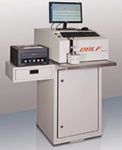
ICP-MS system
PerkinElmer's NexION 300 ICP-MS system is designed to provide the benefits of a collision cell and the detection limits of a true reaction cell. According to the company, the instrument can be run in three different modes: standard, collision, and reaction. A scanning quadrupole reportedly removes targeted interferences and reaction products in the universal cell. PerkinElmer, Waltham, MA;
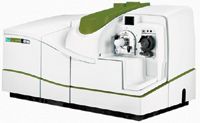
UV–vis spectrophotometers
UV–vis spectrophotometers from Shimadzu Scientific Instruments are designed for routine analysis and research applications. The double-monochromator UV-2700 system reportedly achieves stray light levels of 0.00005% T at 220 nm, a photometric performance range of 8 Abs, and a transmittance value of 0.000001%, which enables the measurement of low-transmittance samples. According to the company, the single-monochromator UV-2600 system features a measurement wavelength range to 1400 nm, which allows measurements in the near-infrared region and analysis of photovoltaics and other materials. Shimadzu Scientific Instruments Inc., Columbia, MD;

Wine standards
Certified reference materials for trace metals analysis in a natural wine matrix are available from Spex CertiPrep. The company is reportedly accredited by UL DQS for ISO 9001 and accredited by A2LA for ISO 17025 and ISO Guide 34. Spex CertiPrep, Metuchen, NJ;
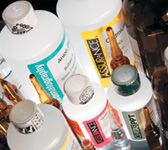
Photovoltaic measurement system
Newport Corporation's Oriel IQE-200 photovoltaic cell measurement system is designed for simultaneous measurement of the external and internal quantum efficiency of solar cells, detectors, and other photon-to-charge converting devices. The system reportedly splits the beam to allow for concurrent measurements. The system includes a light source, a monochromator, and related electronics and software. According to the company, the system can be used for the measurement of silicon-based cells, amorphous and mono/poly crystalline, thin-film cells, copper indium gallium diselenide, and cadmium telluride. Newport Corporation, Irvine, CA;
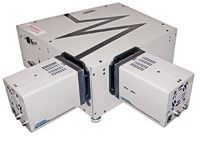
Raman analyzer
The ASSUR handheld Raman analyzer for raw material verification from Enwave Optronics is designed to be fully 21 CFR Part 11 compliant for GMP requirements. According to the company, it is suitable for the analysis of pharmaceutical compounds and industrial chemicals and for applications requiring high-speed Raman analysis. Enwave Optronics, Inc., Irvine, CA;
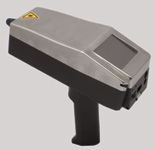
Spectrometer
StellarNet's Black-Comet-HR concave grating spectrometer is designed for high-resolution applications. According to the company, the system is available for measurements in two ranges, UV (200–600 nm) and visible (380–750 nm), and can achieve resolving resolutions of 0.4 nm. The system reportedly is USB-2 powered, shock-proof, and vibration tolerant with no moving parts StellarNet, Tampa, FL;
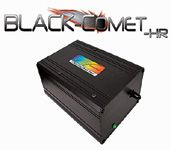
IR gas cell
The 2.4 m IR gas cell from PIKE is designed with a metal body (nickel-coated aluminum), diamond-turned optics, and tool-less assembly and disassembly. According to the company, features include small volume and a heated 200 °C option for analysis of samples containing low-boiling-point components and water vapor. PIKE Technologies, Madison, WI;
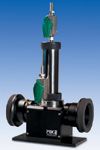
Spectra library
Fiveash Data Management's FDM Raman Organics is a library of 500 Raman spectra of model organic compounds. According to the company, the spectra in the library were run in-focus on a 6-cm-1, white-light-corrected spectrometer with a 780-nm laser, SNR of 500, and a range of 200–3200 cm-1. The library reportedly is available in most spectral library formats. Fiveash Data Management, Madison, WI;
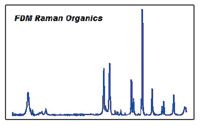
Fiber-optic Raman probes
FiberTech Optica's compact fiber-optic Raman probes are designed to provide enhanced throughput and collected Raman signal quality. According to the company, design features include high collection efficiency (f/2) optics, internal filtering, about 4 mm working distance, and assembly with no moving parts. FiberTech Optica, Kitchener, Ontario, Canada;
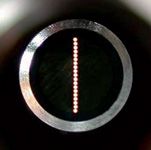
Variable-pathlength FT-IR cell
International Crystal's heated variable-pathlength cell is designed with the ability to be heated to 200 °C and comes with a programmable temperature controller with a RS-232 serial cable computer interface. According to the company, the cell back plate is water-cooled, and the body and vernier scale adjustment on the front of the cell are insulated to enable in situ variation of the pathlength while the cell is situated in the sample compartment of an FT-IR spectrophotometer. International Crystal Laboratories, Garfield, NJ;
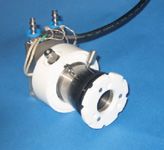
Vis–NIR spectrometer
The Maya2000 Pro-Vis-NIR system from Ocean Optics is designed as a back-thinned 2D FFT-CCD spectrometer with 80% peak quantum efficiency. According to the company, the device has a low-etalon, scientific-grade detector that provides high quantum efficiency from ~400 nm to 1100 nm. Ocean Optics, Dunedin, FL;
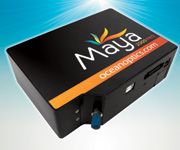
Infrared filters
Infrared filters from CVI Melles Griot are manufactured using a sputter coating process and are designed for durability and environmental resistance. According to the company, the filters are optimized for peak transmission and blocking. The filters can be used for applications such as gas analyzers, nondispersive, or Fourier transform instruments, spectrometers, and biomedical devices. CVI Melles Griot, Albuquerque, NM;
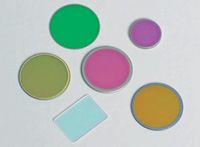
Ruling engines
Optometrics reportedly has upgraded its three ruling engines. According to the company, its premier ruling engine has been outfitted with interferometric, thermal, and electronic control systems and is driven through a computer-controlled operation, allowing for ghost-free UV–vis rulings and custom rulings at wavelengths ranging from UV to far IR. Optometrics, Ayer, MA;
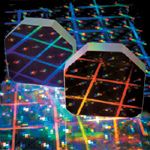
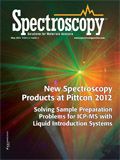
LIBS Illuminates the Hidden Health Risks of Indoor Welding and Soldering
April 23rd 2025A new dual-spectroscopy approach reveals real-time pollution threats in indoor workspaces. Chinese researchers have pioneered the use of laser-induced breakdown spectroscopy (LIBS) and aerosol mass spectrometry to uncover and monitor harmful heavy metal and dust emissions from soldering and welding in real-time. These complementary tools offer a fast, accurate means to evaluate air quality threats in industrial and indoor environments—where people spend most of their time.
NIR Spectroscopy Explored as Sustainable Approach to Detecting Bovine Mastitis
April 23rd 2025A new study published in Applied Food Research demonstrates that near-infrared spectroscopy (NIRS) can effectively detect subclinical bovine mastitis in milk, offering a fast, non-invasive method to guide targeted antibiotic treatment and support sustainable dairy practices.
Smarter Sensors, Cleaner Earth Using AI and IoT for Pollution Monitoring
April 22nd 2025A global research team has detailed how smart sensors, artificial intelligence (AI), machine learning, and Internet of Things (IoT) technologies are transforming the detection and management of environmental pollutants. Their comprehensive review highlights how spectroscopy and sensor networks are now key tools in real-time pollution tracking.